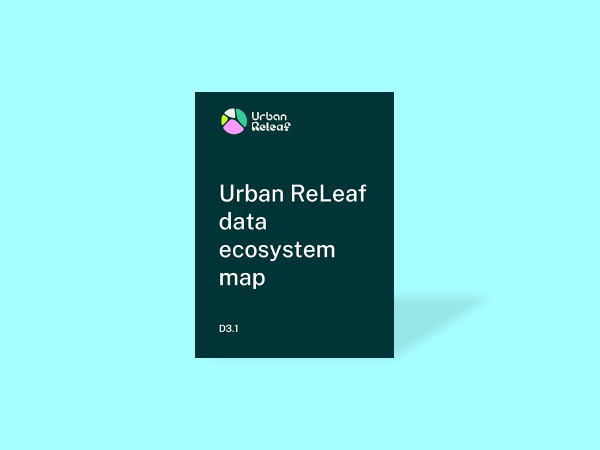The “Urban ReLeaf Data Ecosystem Map” deliverable offers a comprehensive overview of urban greening and relevant data ecosystems across our six pilot cities, Athens, Cascais, Dundee, Mannheim, Riga and Utrecht.
This report plays a crucial role in understanding and enhancing the role of citizen observations alongside official data streams in urban sustainability.
Core Elements of the Report:
- Global and European Vision in Urban Greening: The report begins by examining the wider global and European objectives, underscoring the critical importance of open data ecosystems in addressing urban challenges like climate change, the Urban Heat Island (UHI) effect, and deteriorating urban life quality.
- Understanding Urban Greening: It explains the term “urban greening” and explores public willingness to contribute to these initiatives, emphasising the complexities and drivers behind achieving these goals.
- Open Data Ecosystems Transformation: Inspired by the Open Knowledge Foundation, we advocate for the transition from linear, unsustainable data ecosystems to circular models, enabling data assets to be part of a broader data puzzle space.
- Data Ecosystem Mapping Methodology: Utilising the Open Data Institute’s (ODI) Data Landscape Playbook (DLP) methodology, we outline a four-step process: defining the problem, mapping the data ecosystem, assessing infrastructure, and evaluating policy and ethical contexts.
- Citizen-Powered Observations: We present qualitative and quantitative analyses, aiming to identify opportunities for citizen observations to complement official data streams.
- Expansion of Data Ecosystem: The final chapter explores additional open-access datasets that could enhance the Urban ReLeaf project’s digital tools and technologies.
Implications for Urban Sustainability:
This fulfils a key objective, to catalogue existing data assets and identify citizen-science opportunities to support urban greening. It aligns with broader initiatives, such as the European Green Deal and the UN SDGs, particularly focusing on creating accessible, inclusive green spaces in urban areas.
The report is structured into eight chapters, each detailing different aspects of the data ecosystem, from unpacking wider objectives to assessing policy and ethical contexts. It also includes visual representations of city-specific data ecosystem maps in the appendices.
Impact on Future Urban Greening Strategies:
The insights and methodologies presented in this report will guide the development of Urban ReLeaf’s digital tools, ensuring compatibility with European standards and enhancing the integration of citizen science data sources.
